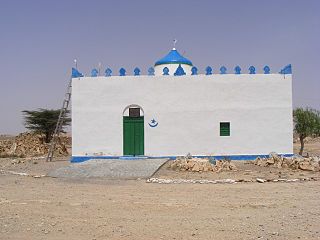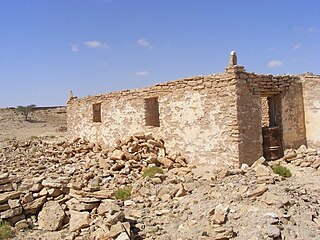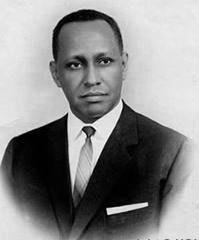Related Research Articles

Somali Salvation Democratic Front (SSDF), initially known as the Democratic Front for Salvation of Somalia, was a political and paramilitary umbrella organization in Somalia. Founded in 1978 by several army officers, it was the first of several opposition groups dedicated to ousting the authoritarian regime of Mohamed Siad Barre. With its power base mainly in the Majeerteen clan, SSDF representatives, along with local elders, intellectuals and business people, were instrumental in the establishment in 1998 of the autonomous Puntland region in northeastern Somalia.

The culture of Somalia is an amalgamation of traditions in that were developed independently since the proto-Somali era through interaction with neighboring and far away civilizations, including other parts of Africa, the Arabian Peninsula, and Indian subcontinent. The hypernym of the term Somali from a geopolitical sense is Horner and from an ethnic sense, it is Cushite.
The Majeerteen is a Somali clan. It is one of the major Somali clans, with a vast traditional territory spanning 3 major regions of Somalia: Bari, Nugaal and Mudug. From Bosaso down to Garacad, the Majerteen are settled in what is literally considered to be the 'Horn of Africa'. Its members form a part of the Darod clan family, and primarily inhabit the Puntland state of northeastern Somalia.

The Isaaq is a Somali clan. It is one of the major Somali clans in the horn of Africa, with a large and densely populated traditional territory.
The Warsangali, is a Somali Clan, part of the Darod. In the Somali language, it means "bringer of good news."

The Hawiye is a major Somali clan. Members of the clan traditionally inhabit central and southern Somalia, Somali Region and the North Eastern Province. They are also the majority in the capital Mogadishu.

The Darod is a Somali clan. The forefather of this clan was Sheikh Abdirahman bin Isma'il al-Jabarti, more commonly known as Darood. In Somalia members of the clan settle in the Federal Member States of Jubbaland and Puntland. In Somaliland they settle the regions of Sool, Sanaag and Cayn. Furthermore, the clan has an ancillary presence in pockets of the states of Koonfur-Galbeed and Galmudug. In Ethiopia the clan settles in the Somali State region, whilst in Kenya they settle in the North Eastern Province.
The United Somali Congress (USC) was one of the major rebel organizations in Somalia. Formed in 1987, it played a leading role in the ouster of the government of Siad Barre in 1991, and became a target of the Unified Task Force campaign in 1993. Following infighting, the USC later splintered into smaller groups. By 2000, with the establishment of a Transitional National Government (TNG), a process of disarmament was put in motion and some moderate ex-USC leaders were incorporated into the new interim administration.
The Dir or Abukar (Abubakr) is the largest and most prominent Somali clan. Its members inhabit Djibouti, Somalia, Ethiopia and northeastern Kenya.

The Gadabuursi, also known as Samaroon, is a northern Somali clan, a sub-division of the Dir clan family.

Harti, meaning "strong man", is a name used to denote a confederation of various Darod sub-clans of the Somali people. The major sub-clans of the Harti are the Dhulbahante, Majeerteen, Warsangali and Dishiishe, other minor Harti sub-clans are the Kaskiqabe, Geesaguule and Liibaangashe.

The Transitional National Government (TNG) was the internationally recognized central government of Somalia from 2000 to 2004.

The Habar Gidir is a subclan of the Hawiye and the even larger Samaale clan. It is one of the major sub-clans of the Hawiye and Somali clans in general. The clan has produced many prominent Somali figures, including the first Prime Minister of Somalia Abdullahi Issa Mohamud and Somalia's fifth President Abdiqasim Salad Hassan.
Over the course of the Somali Civil War, there have been many revolutionary movements and militia groups run by competing rebel leaders which have held de facto control over vast areas of the country.

Somali literature refers to the literary tradition of Somalia. It ranges from Islamic poetry and prose produced by the region's scholars and Sheikhs of centuries past to works of fiction from contemporary writers.
The Habr Awal is a major Somali sub-clan of the wider Isaaq clan family, and is further divided into several sub-clans of whom the two largest and most prominent are the Sa'ad Musa and Issa Musa sub-clans. Its members form a part of the Habr Magaadle confederation. The Habr Awal traditionally consists of nomadic pastoralists, coastal people, merchants and farmers. They are historically viewed as an affluent clan relative to other Somali clans. The Habr Awal are politically and economically influential in present-day Somaliland, and reside in strategic coastal and fertile lands.
The Reer Nuur also known as Nuur Yoonis, is a noble northern Somali clan, a sub-division of the Makahiil sub-clan of the Gadabursi clan family.

The Ministry of Foreign Affairs of the Federal Republic of Somalia is the Somali government ministry which oversees the foreign relations of Somalia. The current minister is Ahmed Isse Awad.

The Ministry of Justice is the ministry that is responsible for the Judiciary of Somalia. It was created in 1956 during the joint Somali/Italian administration with the aim of achieving a sustainable democratic system of governance that operates within a clearly defined and predictable legal environment. The responsibility of the Ministry is to promote democracy, good governance and human rights through the development of policies and programs that enhance the enjoyment of social, economic and political rights.
References
- ↑ Bereketeab, Redie (2017-09-08). National Liberation Movements as Government in Africa. Routledge. ISBN 978-1-351-58883-6.
- ↑ Europa (2002). The Europa World Year Book 2002. Taylor & Francis Group. ISBN 978-1-85743-129-2.
| This biographical article about an African activist is a stub. You can help Wikipedia by expanding it. |
| This Somali biographical article is a stub. You can help Wikipedia by expanding it. |